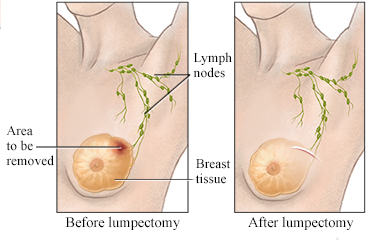
What is a lumpectomy?
Breast-conserving surgery (lumpectomy) removes cancer from the breast. Your doctor will make a small cut (incision) and take out the cancer. The whole breast won't be removed. The doctor will try to also take a small amount of normal tissue around the cancer. This is known as "getting clear margins." Some people will need another surgery to be sure the margins are clear. The doctor may also check the nearby lymph nodes during the surgery.
After surgery, you will probably go home the same day. Most people can go back to work or their normal routine in 1 to 3 weeks. This depends on how you feel. It also depends on the type of work you do and whether you need more treatment. This may include radiation or chemotherapy. Most people who have this surgery for cancer also get radiation treatment.
The surgery will leave scars. Sometimes it leaves a dent in the breast too. And your breasts may not match in size or shape after surgery. This depends on the size of your breasts. It also depends on how much tissue was removed.
How do you prepare for surgery?
Surgery can be stressful. This information will help you understand what you can expect. And it will help you safely prepare for surgery.
 Preparing for surgery
Preparing for surgery
- Be sure you have someone to take you home. Anesthesia and pain medicine will make it unsafe for you to drive or get home on your own.
- Understand exactly what surgery is planned, along with the risks, benefits, and other options.
- If you take a medicine that prevents blood clots, your doctor may tell you to stop taking it before your surgery. Or your doctor may tell you to keep taking it. (These medicines include aspirin and other blood thinners.) Make sure that you understand exactly what your doctor wants you to do.
- Tell your doctor ALL the medicines, vitamins, supplements, and herbal remedies you take. Some may increase the risk of problems during your surgery. Your doctor will tell you if you should stop taking any of them before the surgery and how soon to do it.
- Make sure your doctor and the hospital have a copy of your advance directive. If you don't have one, you may want to prepare one. It lets others know your health care wishes. It's a good thing to have before any type of surgery or procedure.
What happens on the day of surgery?
-
Follow the instructions exactly about when to stop eating and drinking. If you don't, your surgery may be canceled. If your doctor told you to take your medicines on the day of surgery, take them with only a sip of water.
-
Take a bath or shower before you come in for your surgery. Do not apply lotions, perfumes, deodorants, or nail polish.
-
Do not shave the surgical site yourself.
-
Take off all jewelry and piercings. And take out contact lenses, if you wear them.
-
If you wear a bra, bring a comfortable, supportive one with you. For the first week after surgery, you may need to wear a bra or chest binder all the time, even at night.
At the hospital or surgery center
-
Bring a picture ID.
-
The area for surgery is often marked to make sure there are no errors. If your doctor can't feel the lump, a needle can be put in the suspicious area. This may be done during a mammogram just before surgery. The needle will guide your doctor.
-
You will be kept comfortable and safe by your anesthesia provider. The anesthesia may make you sleep. Or it may just numb the area being worked on.
-
The surgery will take about 1 hour or longer, depending on the size of the lump.
When should you call your doctor?
- You have questions or concerns.
- You don't understand how to prepare for your surgery.
- You become ill before the surgery (such as fever, flu, or a cold).
- You need to reschedule or have changed your mind about having the surgery.
Where can you learn more?
Go to http://www.healthwise.net/patientEd
Enter Z252 in the search box to learn more about "Lumpectomy: Before Your Surgery".
Current as of: October 25, 2024
Author: Ignite Healthwise, LLC Staff
Clinical Review Board
All Healthwise education is reviewed by a team that includes physicians, nurses, advanced practitioners, registered dieticians, and other healthcare professionals.

